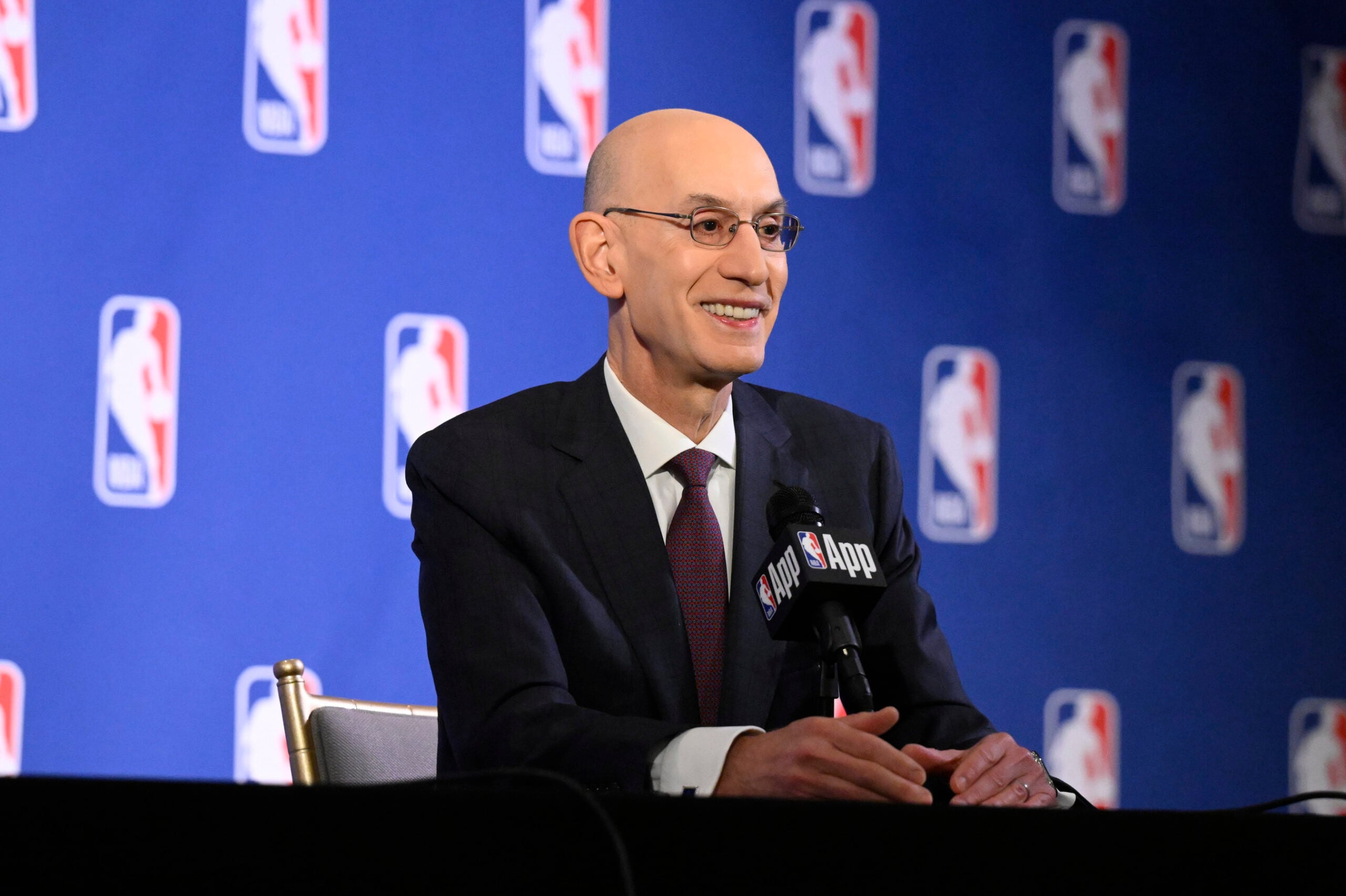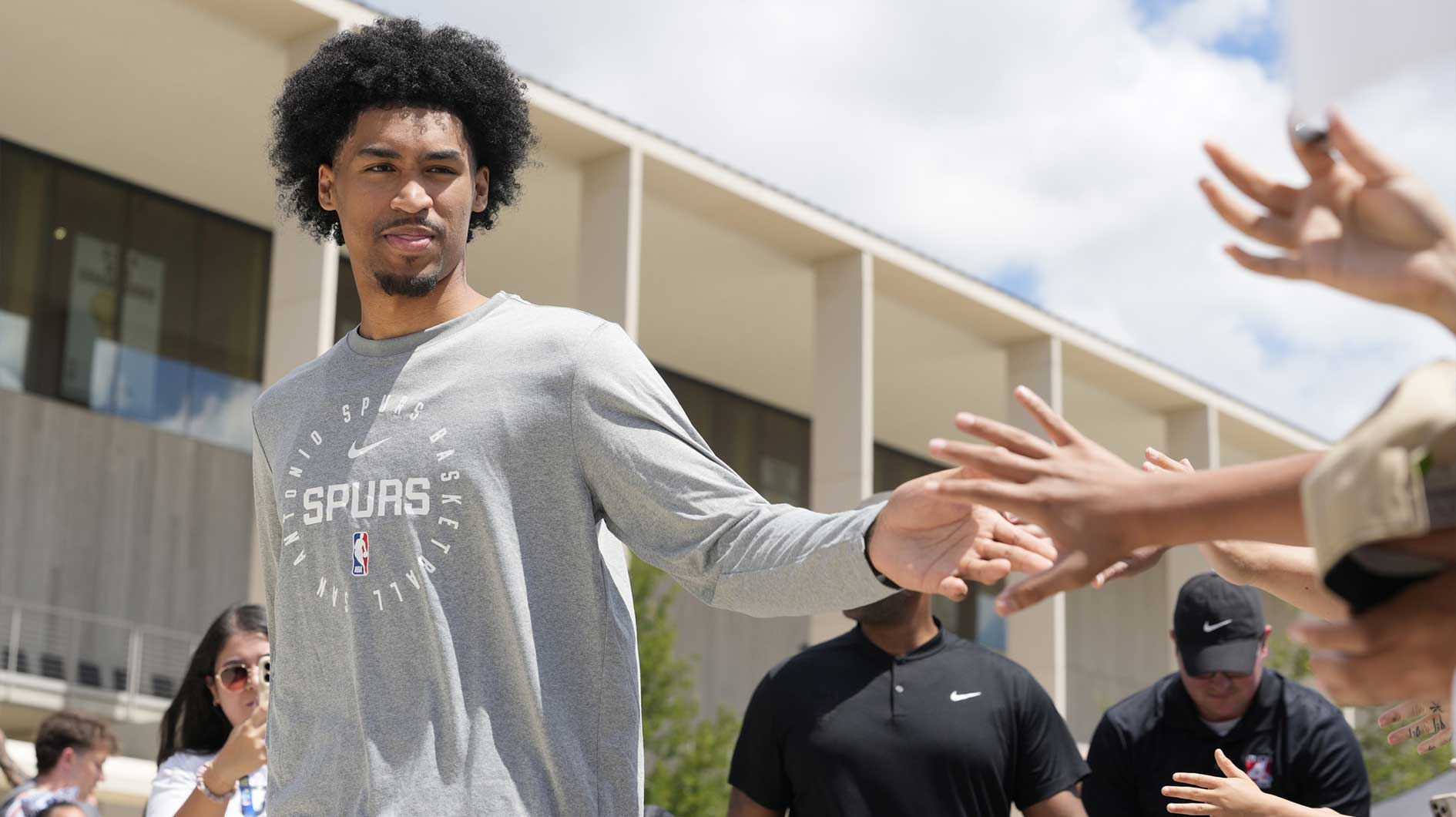Commissioner Adam Silver discusses expansion, the aprons & a streaming future | NBA.com
Following Tuesday's Board of Governors meeting in Las Vegas, Commissioner Adam Silver discusses the possibility of expansion.
As the NBA’s presence in this neon city has grown over the past two decades – from a handful of summer squads staging tryout games for roster hopefuls to the full-blown, 30-team league convention it’s become – Commissioner Adam Silver has taken to referring to Vegas as “the 31st franchise.”
That’s unofficial, of course, a term of appreciation for what the Las Vegas Summer League and all its trappings have meant to the NBA for 11 days or so each July. Real talk of a 31st franchise, a 32nd, or any beyond that was addressed earlier in the day Tuesday at the annual offseason Board of Governors meeting held at a posh Strip resort hotel.
No champagne corks were popped in Seattle, Mexico City, locally or anywhere else entrepreneurs and civic leaders are hungry for NBA membership. But the league did take what Silver termed the significant step of tasking a committee to do an in-depth analysis of expansion, in both its economic and non-economic impact.
That means everything from the likely price of new franchise to the dilution of shared broadcast revenue, from the marketing potential opened in new NBA markets to finding enough stars and top supporting talent for additional rosters.
I would define more as curiosity and more ‘Let’s do the work,'” Silver said when asked if he sensed a “hunger” for expansion among the 30 team governors. The commissioner spoke to reporters at a news conference at the Thomas & Mack Center on the UNLV campus, as two summer league games went on in the complex.
“If I were an owner, ultimately, what you’re considering is, is this additive to the league?” he said. “Additive can be measured in lots of different ways. There’s additive economically. But I think there is, from a competitive standpoint, how would particular markets impact our national footprint.”
The expansion exploration work will be done in a joint venture of the league’s Advisory Finance committee and its Audit & Strategy committee. Local/regional television coverage, an area of NBA business plagued by instability, is another issue that will be studied, the commissioner said.
waiting to join the party, the incremental step Silver discussed Tuesday might be frustrating. It still could be several years before a specific city or group even gets the chance to be formally disappointed.
“I wish standing here as the commissioner, I had teams to dispense to many different markets who are interested in NBA basketball,” Silver told a reporter from Seattle, where the league operated from 1967-2008, until the team was sold and moved to Oklahoma City.
It’s a market that some speculate as a frontrunner if and when the league expands, one Silver called “incredible” while noting the presence of a thriving WNBA team.
Still, he said: “I think we also have this greater obligation to expand, if we do so, in a very deliberate fashion in a way that makes sense holistically for the league. That’s really the best I can do.”
This much is certain: The admission fee of any new member likely has increased significantly, owing to recent sales of the Boston Celtics and the Los Angeles Lakers with valuations of $6.1 billion and $10 billion, respectively.
“Had we expanded five years ago,” Silver said, “we would have underpriced the market.”
Silver fielded other questions during the news conference, on topics including:
Two current NBA players, Malik Beasley and Terry Rozier, are the subject of federal investigations for possible sports betting irregularities. Silver said the NBA is cooperating with authorities. He suggested that legalized gambling at least allows for formal oversight of data and behavior, compared to the shadows in which illegal betting did and does take place.
The NBA does business with gambling companies. Silver likened the prospect for illegal behavior to what goes on in the stock market.
“The fact that there might be insider trading doesn’t mean you’re necessarily going to shut down those public markets,” he said. “But often the way they are catching insider traders is because they have a system, a complex system, that detects aberrational behavior.”
Proposition bets, often tied to individual statistical categories rather than a team’s overall point spread thus fall more within a player’s control. It was evident Silver sees the pitfalls there.
“We do not have control over the specific bets that are made on our game. I do think some of the bets are problematic,” Silver said.
What the league does have, though, is the hammer to address bad decisions.
“Anybody in this league, any player who engages in that activity, there’s no question they are putting their livelihood at risk,” Silver said. “It’s a message that’s important that we deliver to our players or anyone who is in our community.”
Oklahoma City’s triumph in the 2025 Finals last month gave the NBA its seventh different champion in seven seasons, dating back to 2019. That is seen as a sign the philosophy behind and mechanisms in the league’s collective bargaining agreement with the players are working. That is, for any well-managed franchise to be competitive.
And yet, Silver doesn’t want anyone to think the NBA has tried to legislate out dominance. The league grew tremendously in popularity during the multiple championship runs of the Celtics, the Lakers, the Bulls and the Spurs.
“I’m perfectly comfortable with dynasties,” he said. “I like what we’re seeing right now. I’m not ready to declare, we are not going to have dynasties. I’m sure [Thunder executive VP and GM] Sam Presti isn’t ready to hear that.”
The Trail Blazers were put up for sale in May by the estate of their late owner, Paul Allen, beginning a process expected to take a year or more. Silver said the NBA prefers that the franchise remains in Portland, though adding: “One of the factors there is the city of Portland likely needs a new arena. So that will be part of the challenge for any new ownership group coming in.”
In its new 11-year, $76 billion broadcast deal, every NBA game – including those made available over-the-air (ABC, NBC) and on cable (ESPN) – will be streamed. Unlike days of yore in which audience were tracked one-way via Nielsen ratings, the new technology will enable the league to gather data on its consumers. Amazon Prime and NBC’s Peacock will partner as streamers, too.
“It’s about knowing who your consumers are and customizing your feeds for them,” Silver said. “That’s one of the advantages of streaming.” Various game feeds and camera angles can be made available, for example, as well as background info on players during contests and even merchandise opportunities.
Adam Silver meets with media in Las Vegas to discuss expansion and other key topics in his latest press availability.
Steve Aschburner has written about the NBA since 1980. You can e-mail him here, find his archive here and follow him on X.
You may also like...
Diddy's Legal Troubles & Racketeering Trial

Music mogul Sean 'Diddy' Combs was acquitted of sex trafficking and racketeering charges but convicted on transportation...
Thomas Partey Faces Rape & Sexual Assault Charges

Former Arsenal midfielder Thomas Partey has been formally charged with multiple counts of rape and sexual assault by UK ...
Nigeria Universities Changes Admission Policies

JAMB has clarified its admission policies, rectifying a student's status, reiterating the necessity of its Central Admis...
Ghana's Economic Reforms & Gold Sector Initiatives

Ghana is undertaking a comprehensive economic overhaul with President John Dramani Mahama's 24-Hour Economy and Accelera...
WAFCON 2024 African Women's Football Tournament

The 2024 Women's Africa Cup of Nations opened with thrilling matches, seeing Nigeria's Super Falcons secure a dominant 3...
Emergence & Dynamics of Nigeria's ADC Coalition

A new opposition coalition, led by the African Democratic Congress (ADC), is emerging to challenge President Bola Ahmed ...
Demise of Olubadan of Ibadanland
Oba Owolabi Olakulehin, the 43rd Olubadan of Ibadanland, has died at 90, concluding a life of distinguished service in t...
Death of Nigerian Goalkeeping Legend Peter Rufai

Nigerian football mourns the death of legendary Super Eagles goalkeeper Peter Rufai, who passed away at 61. Known as 'Do...




